By Codi Darnell
October 18, 2022
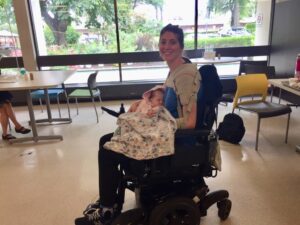 Everyone experiences events that alter the course of their life; many of them are embraced: the chance encounters that turn into long-term partnerships; the arrival of a child that transforms you into a parent; the job offer that kickstarts your career. But there are others we hope to avoid as much as possible: the accidents; the illnesses; the job losses. Whether they are welcomed or dreaded, they all shift our realities and require us to adjust ourselves within new parameters. Ideally, we are only faced with one big life-altering change at a time but, as Kathryn Simpson knows, we don’t always have the luxury of choice. She was 31 years old when the best and worst of moments happened simultaneously.
Everyone experiences events that alter the course of their life; many of them are embraced: the chance encounters that turn into long-term partnerships; the arrival of a child that transforms you into a parent; the job offer that kickstarts your career. But there are others we hope to avoid as much as possible: the accidents; the illnesses; the job losses. Whether they are welcomed or dreaded, they all shift our realities and require us to adjust ourselves within new parameters. Ideally, we are only faced with one big life-altering change at a time but, as Kathryn Simpson knows, we don’t always have the luxury of choice. She was 31 years old when the best and worst of moments happened simultaneously.
Kathryn
Kathryn grew up on the west coast of Canada, active in sports and confident that one day she would be both a teacher and a mom. After spending time at university in the United States on a field hockey scholarship, followed by years of coaching Division 1 field hockey, Kathryn returned to British Columbia to finish her education degree. It was there at the University of British Columbia that she met her husband, Ian. They married in 2016 and by the spring of 2018, Kathryn was teaching elementary school while preparing for the birth of their first child.
The Stroke
Maternity leave was quickly approaching when the end-of-lunch bell rang one day and Kathryn and her students started filing back into the classroom. But Kathryn didn’t feel right – nothing specific she could label, just that she “felt a little funny”. It was her students who took notice when her speech began to slur and went off in search of the principal. Soon after, the entire left side of Kathryn’s body shut down leaving her unable to move. The principal’s knowledge of stroke symptoms meant an ambulance was soon enroute and Kathryn was transferred to Vancouver General Hospital. After multiple tests, it was confirmed that Kathryn suffered a stroke, and it was soon decided that the baby needed to be delivered.
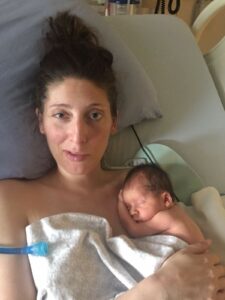 Giving Birth
Giving Birth
48 hours post-stroke, Kathryn delivered a healthy baby girl via C-section; they named her Isla. However, between having been put under general anaesthetic for the surgery and Isla requiring a brief stay at the NICU at a different hospital, Kathryn did not get a chance to meet her daughter that day. Or the day after. Kathryn began asking questions on repeat, “Did I have a baby? Was it a girl? What’s her name?”. Her questions would be answered only for them to start all over again. It was a psychiatrist that finally made it clear that Kathryn needed to meet her baby and, at two weeks old, Isla was brought to the hospital and the two were reunited.
Moving to Rehab
Just as a bed opened for Kathryn at the rehabilitation centre, Isla was admitted to the hospital with bacterial meningitis. With her daughter fighting for her life, Kathryn now had a difficult choice to make – take the bed to further her recovery or put herself on the backburner to be at her daughter’s side. Knowing that their little family had a huge support system behind them, Kathryn took the spot at rehab. For the next several weeks, her and Isla both recovered in neighbouring medical facilities. So close that Kathryn could cross the street and see her every day.
Finding Progress and Connection
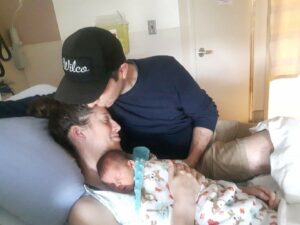 As much as Kathryn was struggling with fatigue and memory, she says she understood she would only get to go through this baby stage with Isla once. She also knew she only had one chance at recovery. So, she worked at both, keeping up with her therapy appointments and taking time to connect with her daughter whenever she could.
As much as Kathryn was struggling with fatigue and memory, she says she understood she would only get to go through this baby stage with Isla once. She also knew she only had one chance at recovery. So, she worked at both, keeping up with her therapy appointments and taking time to connect with her daughter whenever she could.
She was afraid that the connection wouldn’t come but, even though it was nothing like she imagined, she kept at it. Wanting to supply Isla with breastmilk, she pumped when she could and then took it over to the hospital in the cup holder of her wheelchair. Even though she couldn’t pick Isla up, she held her with the assistance of others. And the one thing she had at her disposal that she could give without the help of others was her voice. The sound her daughter knew from the months spent inside of her. She sang and read stories to Isla as much as she could. But no matter what she did with her daughter, she always tried to make sure their time together was spent with great intention
Still, she struggled to come to terms with what these early days of motherhood had become. While her and her husband had always imagined parenting as a partnership, Kathryn held onto the idea that, especially through maternity leave, she would be primarily in charge of Isla’s care. Now she felt like a visitor while Ian took on the full responsibility of parenthood.
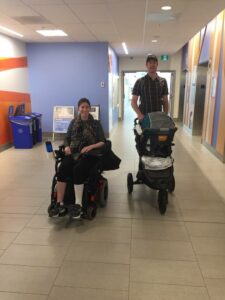 Going Home
Going Home
After four months spent at the rehabilitation centre, and just weeks after Isla went home, Kathryn was discharged to join her. This transition was met with excitement and trepidation. With help always available, living at rehab was like being in a bubble. At home, they were on their own, and Kathryn felt the bubble burst quickly after they arrived.
Being discharged does not mean all is well. Kathryn was still in a phase of recovery, requiring help for many simple tasks. Beyond the help she required for herself, she was still unable to do much for her daughter. She wasn’t able to change diapers nor was she getting out of bed in the middle of the night when her daughter cried. It was a jarring reality next to what she had imagined being home with her child would be, and a catalyst to a dark time for her.
Merging Identities
In the midst of discovering who she was as a mother and a stroke survivor, Kathryn found herself comparing those identities to who she was as a person, and who she imagined she would be as a mother, before her brain injury. She says she placed herself into boxes, separating her identities based on the lasting effects of the stroke. Eventually though, things began to shift.
It was as Isla became a toddler that Kathryn found her stride. Not only was Isla more independent, but so was she. She could walk with the use of a cane and a brace on her left leg, and she was more confident moving around the world without the use of her left arm which remained stubbornly asleep. Now, instead of always focusing on what she lost, she found ways to celebrate what she still had. After some time, Kathryn began accepting herself as one whole, stroke-surviving mother.
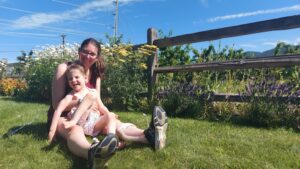 Unexpected Similarities
Unexpected Similarities
It’s true that Kathryn is still navigating grief surrounding her mother/daughter relationship with Isla. However, an unexpected and unique similarity emerged throughout their journey. At a year old, it was discovered that Isla developed moderate cerebral palsy from her bout with meningitis. Two separate brain injuries from two unrelated events that resulted in a shared disabled experience.
As Isla grew, it became clear she would require mobility aids to help her get around the world – just like Mommy. That made Kathryn take stock of how she put her disabled self out into the world. Kids learn by watching their parents in all aspects of life, and Kathryn realized she has a rare opportunity to “walk the walk” when it comes to living with a disability. It allowed Kathryn to find more confidence in her disabled body so that her daughter may do the same.
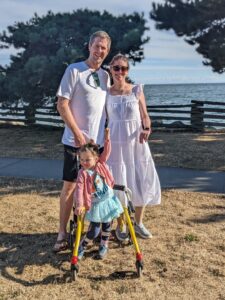 The Path Forward
The Path Forward
Today, Kathryn, Ian, and Isla have settled into their family dynamic. Kathryn says that she and Ian have very specific parenting roles that allow for them to be the best parents they can be for their daughter. The lasting physical and cognitive effects from the stroke, including fatigue, slower processing speed, and small seizures that come and go at random, have made it difficult for Kathryn to be independent with Isla. However, she has learned to embrace the extra caregivers and love that surrounds all three of them.
Each day still brings new challenges (some situations that bolster and some that undercut Kathryn’s confidence) and new opportunities to process the losses and wins of this journey, of which there are many. But at the end of the day, Kathryn had one chance to give her all to her recovery, she had one chance to be there for her daughter – and she did both. Four and a half years later, she is connected to her daughter, she is a mom, she is a stroke-survivor, and she’s still getting up every day and doing her thing.
For information on NervGen Pharma Corp., a clinical stage biotech company dedicated to creating innovative solutions for the treatment of nervous system damage, please follow us at www.nervgen.com.
